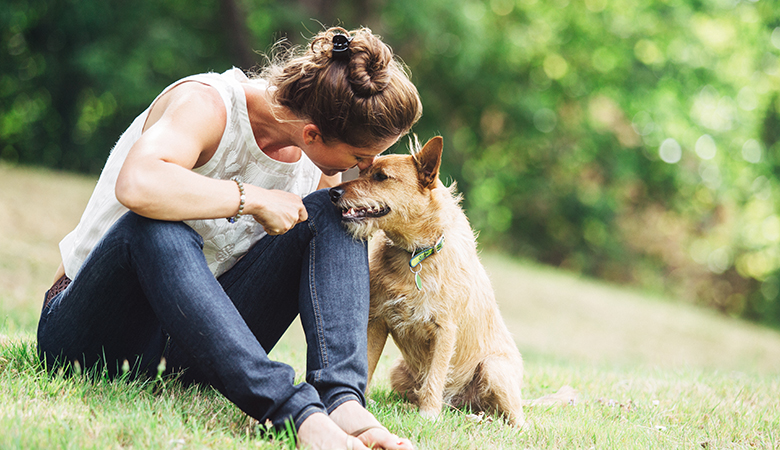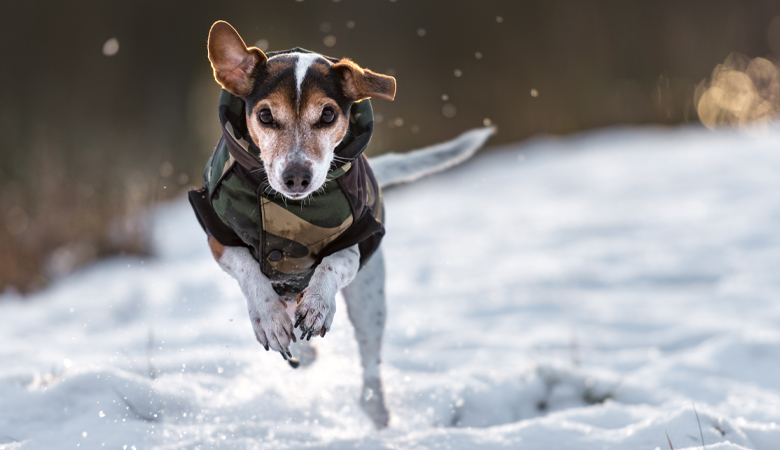1. Provide a comfortable resting place
Senior dogs sleep more and often suffer from stiffer joints. A supportive dog bed helps relieve pressure on the joints and prevents pressure sores. Ideally, choose an orthopaedic or memory foam bed, such as an orthopaedic dog bed, and place it in a quiet, draught free spot in your home.
2. Keep your dog moving
Exercise remains important, even for older dogs. It helps maintain muscle mass, supports the joints and prevents excess weight gain. Choose shorter, more frequent walks rather than long, intense outings. Keep a close eye on signs of tiredness or stiffness afterwards.
3. Choose age appropriate food
Senior dogs have different nutritional needs than puppies or adult dogs. This can mean fewer calories, extra fibre or specific support for joints, kidneys or digestion. If you notice that your dog finds it difficult to eat from bowls on the floor, you can raise the food and water bowls a little, or use bowls on a stand, for example by choosing bowls on a raised stand.
4. Support joints and mobility
Many older dogs develop osteoarthritis or stiff joints. You can support your dog by:
- Using supplements containing nutrients such as glucosamine, chondroitin, green lipped mussel or omega 3
- Providing gentle exercise (such as walking or swimming), possibly in consultation with or under the guidance of a canine physiotherapist
- Using pain relief or anti inflammatory medication prescribed by your vet if needed. Read more in our blog about pain relief for dogs.
You can also look at the range of supplements that support muscles and joints.
5. Stimulate the brain
Mental stimulation is just as important as physical exercise. Older dogs benefit from brain games, snuffle mats or short training sessions. This keeps them alert and content. For example, you can use a snuffle mat.
6. Pay attention to teeth and grooming
Dental plaque and tartar are more common in older dogs. Regular dental care helps prevent pain, inflammation and bad breath. Use dog friendly toothpaste and have your vet check and clean the teeth if necessary. Take a look at our assortment of dental care products for dogs.
Also keep an eye on coat and nails. Senior dogs may groom themselves less and their nails may not wear down properly because they walk less or put their weight down differently. You can help keep the skin and coat in good condition with supportive supplements, such as Dermoscent Senior Spot-On.
7. Have your dog checked regularly by your vet
An annual health check is especially important for senior dogs. Age often comes with health problems and the earlier you detect them, the better they can be treated. Preventive blood tests can help to identify reduced organ function, such as kidney disease, at an early stage. That way, appropriate measures can be taken to keep your dog in the best possible condition for as long as possible.
Common age related problems in senior dogs include:
- Osteoarthritis: noticeable as stiffness, lameness, difficulty getting up
- Kidney problems: more drinking and urinating, reduced appetite, weight loss
- Dental problems: tartar, inflamed gums, bad breath
- Heart disease: often first seen as coughing, tiredness, faster breathing
- Cognitive decline: behavioural changes, disorientation, loss of housetraining
- Overweight or, on the contrary, weight loss
- Skin and coat problems: flakiness, dull coat, slow wound healing
- Loss of senses: your dog may see or hear less well
Have your dog checked at least once a year, or more often if there are existing health issues.
8. Support your senior dog with supplements
There are various supplements designed specifically for senior dogs that support several aspects of ageing, such as brain function, skin and coat quality, immunity and joints. Examples include:
You can also take a look at our full range of supplements and products for senior dogs in our dog pharmacy.
9. Be patient and adjust your expectations
Remember: your dog may be slowing down a little, but they are still the same loyal companion. Expect less in terms of physical performance, and offer even more love, rest and attention. A safe and predictable environment helps your dog feel secure and comfortable.
Do you still have questions about supporting your senior dog? Please contact our veterinarian at veterinarian@vetsend.co.uk.








